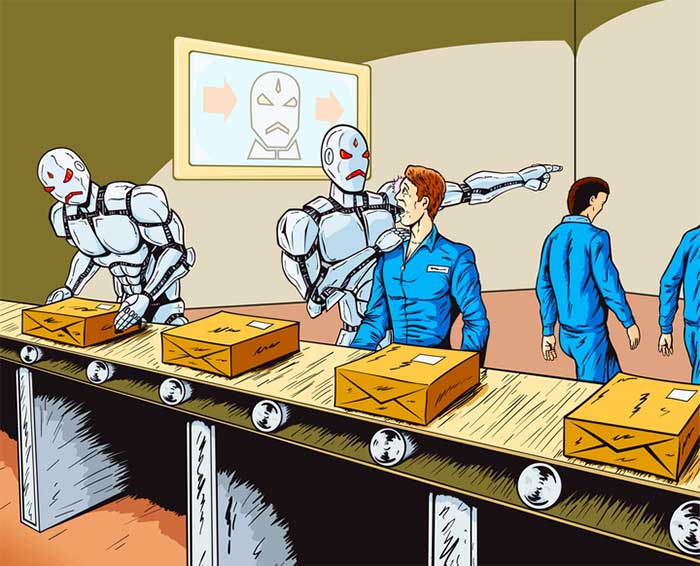While it is true that artificial intelligence (AI) will take on some jobs, it cannot “dominate the world” as some media outlets claim.
We all understand and believe in the game-changing nature of artificial intelligence (AI), which has permeated every aspect of our personal lives and careers. The emergence of AI and intelligent automation is leading to a redistribution of tasks between humans and machines.
However, beyond exerting a certain dominant influence, AI is also unlikely to replace jobs that require human skills such as judgment, creativity, physical dexterity, emotional intelligence, and critical thinking.

While it is true that artificial intelligence (AI) will take on some jobs, it cannot “dominate the world” as some media outlets claim. (Image: Danomyte/ Shutterstock).
Below are details on jobs that AI cannot replace.
Surgeons and Healthcare Professionals
Doctors, nurses, surgeons, physician assistants, and other healthcare staff combine medical knowledge, clinical judgment, empathy, and human interaction, including sensitivity in diagnosing, examining, and treating patients. While AI technology can support and enrich diagnostic and treatment recommendations, it cannot replace the human aspect of healthcare.
Lawyers
The legal profession includes roles such as lawyers, judges, and legal advisors, which often involve making complex decisions requiring in-depth contextual understanding and high judgment ability, all of which are beyond AI’s reach.
Legal professionals often interpret and apply the law based on the specific circumstances of each case, a task that requires intellectual flexibility and a profound understanding of society and interpersonal interactions. While AI can help automate routine tasks like summarizing legal documents, it struggles to interpret details with the nuanced understanding required by the law, especially in complex lawsuits and cases.
Furthermore, practicing law is fundamentally a human endeavor that heavily relies on communication skills and emotional intelligence. Lawyers must understand the emotions and perspectives of the parties involved, build relationships, and persuade others, including judges and juries. These essential soft skills in the legal profession are areas where AI is severely lacking.
Additionally, ethical considerations must be taken into account. Using AI in making legal decisions can raise serious concerns about ethics and fairness. Issues of bias in AI, transparency in decision-making processes, and accountability for AI-generated decisions are challenging dilemmas.
Executives and Leadership Positions
Leadership roles require a broad vision, quick thinking ahead of any other developments, which AI has yet to achieve. Even factors like strategic thinking, decision-making ability, motivation, inspiration, and team-building are core areas where AI is unlikely to excel.
Research and Scientific Development
Scientific research always involves exploring the unknown, curiosity, forming hypotheses, and a keen sense for continuous experimentation, all of which rely on human creativity and deep understanding. Currently and in the foreseeable future, it is difficult to envision an AI system that can accomplish this autonomously.
Therapists and Counselors
Providing emotional support, therapy, and counseling requires deep empathy, human connection, and understanding of complex emotional nuances, making it unlikely that AI could replace professionals in this field.
Teaching and Education
While AI can provide information and assist in education or training, teachers offer spiritual support, adaptability to individual learning styles, and practical guidance that AI cannot provide. This is one of the jobs least likely to be replaced by AI.
Writers
In reality, writers are individuals who generate ideas and produce original content; the uniqueness of written texts is inherent, and writers need a certain level of creativity and empathy. AI and machines will never be able to replicate this, meaning that no matter how advanced they become, AI is unlikely to replace the role of a writer.
Event Organizers
In practice, event organizers must coordinate and negotiate with others to ensure everything runs smoothly. Event planners require human creativity and personal communication skills to meet the unique needs of clients and handle unforeseen situations. AI may assist with logistical tasks, but it lacks the emotional intelligence, intuition, and proactivity needed to plan or execute a successful event.
Construction Workers
In the near future, much of the design work for buildings will be done with the help of AI software, but when it comes to construction, nailing and laying bricks, the construction industry will still rely heavily on the physical labor of traditional builders.
Plumbers
Plumbers deal with plumbing systems facing countless different issues, requiring problem-solving skills and adaptability. They must assess unique situations and consider the condition of plumbing systems in homes. AI lacks the necessary judgment that humans possess for plumbing tasks.
Electricians
AI cannot fully replace electricians, as their work requires adaptability to complex and unpredictable electrical systems, troubleshooting, and ensuring absolute safety.
Welders and Metalworkers
These tradespeople work on projects with materials of varying thickness and shapes, requiring high levels of control and expertise. They must make real-time adjustments to material structures based on visual and tactile feedback, which is currently challenging for AI.
Welding and metalworking also require creativity and innovative problem-solving in complex, non-standard projects. Notably, underwater welding is considered one of the most dangerous jobs in the world.
Chefs and Culinary Experts
Artificial intelligence will never be able to replace culinary experts due to their artistic nature, innovation, and highly sensitive senses. After all, AI can assist in creating and optimizing recipes, but it cannot compare to or completely replace chefs and culinary specialists.
Firefighters
AI cannot replace emergency responders like firefighters, as their roles require swift physical reactions to dangerous, complex situations that can threaten lives. Firefighting involves making quick, timely, and accurate decisions, and they must possess high physical strength—qualities that artificial intelligence cannot attain.
Carpenters
Carpenters create wooden structures according to specifications, requiring creativity, skill, and quick adaptability, making this one of the jobs that AI is unlikely to replace anytime soon.





















































